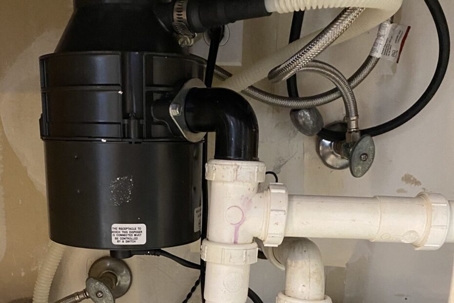Over time, all garbage will start to break down or become damaged, leading to a leak. In most cases, garbage disposals will start leaking from the bottom, from the drain, or from the outer housing. Most issues that cause a leak require disassembling the garbage disposal, so the best way to prevent a repair headache is to keep a close eye on what you put down your garbage disposal and prevent these issues from occurring in the first place.
Why Is My Garbage Disposal Leaking?
Caution: One of the major reasons that newer garbage disposals leak is that they are either installed incorrectly or they are damaged because they were dropped.
It might sound strange that so many people drop garbage disposals, but the reality is that they can be heavy. If you are doing work around your sink and need to remove the unit and then put it back in, it is a good idea to plan to put in some kind of lower support that will keep the disposal from falling while you re-install it.
Another problem that happens from time to time is that something large or difficult to grind gets stuck in the disposal and causes damage that results in a leak. The best way to avoid this is to look carefully at the manufacturer’s directions regarding just what you can safely grind with that type of motor or assembly.
One family who had just purchased a new home found this out when they developed a leak after a few months because they were used to using a heavy-duty model at their old house and the new model that came with the house that they bought was not as strong. So they cleared their plates like they normally would and ended up with some damage. If you just make a point of knowing what is okay and what isn’t, you will save time and money.
What Not to Put Down Your Garbage Disposal
One big problem that can occur with garbage disposals can be related to the drainpipe that removes the wastewater from your kitchen. The biggest culprits are usually:
- Fats
- Oil
- Grease
Water then backs up into your sink, making it possible for an aging disposal to start to leak. You might also see leaks from where the drain pipe leads into the disposal. To avoid this, it is a good idea to remove all fats, oils, and grease from your plates and not let them go down the sink. Your disposal will chew most items up, but these types of waste will not be that affected.
In most cases to check your connection to your drainpipe, you can open the cupboard under the sink and examine where the pipe leads into the disposal. It helps to do this on a regular basis to ensure that you do not have drops of water coming from where the two pieces join.
If you do have your pipes back up and you do not have a leak in your garbage disposal, it is a good idea to fix the problem right away so that you do not risk damaging your disposal unit by having water potentially sit in it for extended periods of time. Hiring a plumber can also help here because they are able to efficiently locate the source of the blockage and repair it right away.
One family was experiencing their kitchen sink stopping up with water, draining slowly over the course of a couple of months, and then eventually it wouldn’t drain at all. Despite using regular drain cleaning products (like Draino, which Jennings Plumbing does not recommend due to the damage it can cause to pipes over time), the situation did not improve. They gave us a call, we came out with a drain snake and camera, then we were able to quickly pinpoint the problem and had their pipe cleaned out and operating normally shortly afterward.
How to Find and Prevent Cracks
As garbage disposals age, they are subject to the same type of wear and tear as other appliances. Inexpensive models may end up having blades and parts that will wear out more rapidly, and the housing for the unit can become cracked if it is exposed to abuse or stress.
- To avoid cracks, one suggestion is to keep the space under your sink near the disposal free from any garbage can or recyclable container that isn’t plastic. Even if the container is plastic, it helps if you do not fill it or wedge it in tightly next to the disposal housing.
- Checking for cracks normally just requires using a flashlight and a cleaning rag. You can wipe the housing with the rag and feel for cracks as you visually inspect it.
- Garbage disposals are a very well-used appliance in most households. Following the usage guidelines for each manufacturer, keeping them free from fat, oil, and grease, and making certain that they are not failing due to cracks can extend their life and make your life better.
On the other hand, if you do have a problem and would like to get efficient, professional plumbing help, please contact Jennings Plumbing Services, servicing the North Dallas area including Dallas, Coppell, Farmers Branch, Flower Mound, Grapevine and Irving, Las Colinas & Richardson! Call Today at (972) 458-5584!

